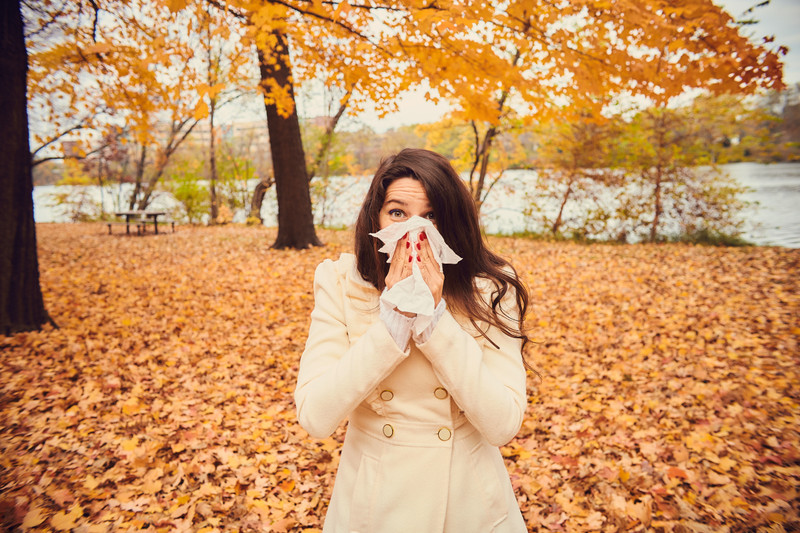Just when you thought it was safe to go back into the water . . . Okay, this isn’t about that, but there is an analogy here. Those of us, this writer included, who have been beset by the annual rites of spring annoyances known as spring allergies, found this to be a tougher year than usual. Spring allergies – doctors know this ordeal formally as allergic rhinitis – stretched into summer. We finally survived that, only to find that another round of allergies is already upon us. Say hello to fall allergies.
Does this stuff ever end?
“What a lot of people don’t realize is that the allergy seasons have almost doubled in length and gotten more intense because of climate change,” says Kenneth Mendez, president and chief executive of the Asthma and Allergy Foundation of America, quoted by the New York Times. Mendez also said increased emissions of carbon dioxide are boosting the amounts of pollen being given off by plants.
Where spring allergies typically begin with tree pollination followed by grass pollen, fall allergies are mostly brought on by ragweed, a tall, slinky plant that grows wild pretty much throughout most of the country. It blooms and spits out pollen from August to November, reaching their peak from early to mid-September.
Know this, too: ragweed allergy affects more than 20 million people a year in the U.S,, which isn’t surprising considering there are 17 species of ragweed, its pollen as light as a feather and able to spread for miles in the wind.
Ragweed is eventually joined in October by environmental smoke from burning leaves, leaving behind waves of sufferers with itchy eyes, nasal congestion, headaches, and/or rampant draining of mucous into the throat and lungs known to cause a persistent cough. Other sources of fall allergies can include burning bush, cocklebur, lamb’s quarters, mold, pigweed, sagebrush and mug wort, and tumbleweed and Russian thistle. Feel free to google any or all of those for explanations.
How to Avoid Fall Allergy Triggers
Preventative tips to help deter fall allergies include keeping all windows and doors to your homes closed during ragweed season, wearing a NIOSH-rated 95 filter mask when mowing the lawn or doing other outdoor chores, and then taking a shower and washing your hair when you are back inside followed by putting on a fresh set of clean clothes.
6 Herbs and Supplements that Could Help Alleviate Allergy Symptoms
Another layer of protection, so to speak, from seasonal allergies comes in the form of natural remedies such as vitamins, herbs, and supplements. Here are six to consider, but be sure to consult with a physician or allergist before adding any of these to your daily regimen. In alphabetical order:
Berberine. This plant-based supplement with roots dating back many years in traditional Chinese medical practice has so many practical applications – among them being antibacterial, antifungal, and anti-inflammatory – that it should be no surprise that studies with animals have shown that berberine has demonstrated some anti-inflammatory effects on allergic rhinitis.
Vitamin C. This powerful antioxidant, available to the body only via foods and supplements, is known for its capacity to support the immune system. One study in which participants were given 2,000 milligrams of vitamin C for eight weeks to combine with exercise showed a great improvement in allergy symptoms such as running nose, sneezin, and congestion.
Quercetin. Also found as a natural ingredient in many foods, quercetin, an antioxidant, has been revealed to also have anti-allergic and antihistamine characteristics.
Spirulina. This is a type of algae shown by studies to have antihistamine effects. For instance, a 2020 study testing spirulina against prescription antihistamine cetirizine in 50-plus patients with allergic rhinitis discovered that the natural remedy performed better than the medication in improving allergic symptoms.
Turmeric. Studies using turmeric have been limited, but what work has been done in that regard has shown turmeric’s key component, curcumin, to show promise in relieving the symptoms of hay fever (allergic rhinitis). It concluded that curcumin ingested orally for two months reduced sneezing and runny nose.
Zinc. Zinc, like vitamin C, is probably best known for bolstering the immune system. But it has also been shown to tamp down inflammation caused by allergies. Furthermore, it should be noted that people with a zinc deficiency are five times more likely to have to deal with allergies than people without a deficiency.
Fall allergy season is upon us, apparently more intense and lingering than ever, forcing people prone to suffer from allergic rhinitis to be diligent about separating themselves from allergy sources, such as ragweed and smoke. They also need to be stocking up on supplements and other over-the-counter remedies to find relief from the varied symptoms. Be sure to discuss your use of any of these products with your physician or other healthcare professional before adding them to your daily routine.

